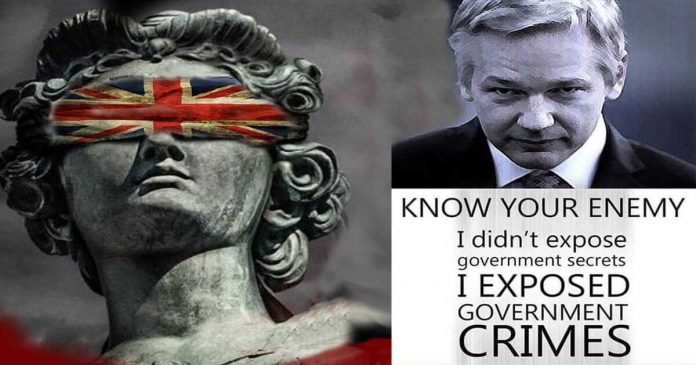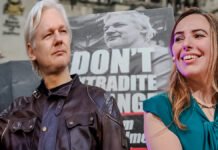District Judge Vanessa Baraitser refused a US request to extradite WikiLeaks founder Julian Assange on espionage charges.
The judge blocked the request because of concerns over Mr Assange’s mental health and risk of suicide in the US.
Although this is a good result for Julian and wholeheartedly welcome, it leaves you feeling a little disappointed. Judge Vanessa Baraitser more than certainly came to the right decision on refusing Julian Assange’s extradition and while her reasons are valid they are in fact the wrong reasons.
District Judge Vanessa Baraitser ruled that while US prosecutors met the tests for Mr Assange to be extradited for trial, the US was incapable of preventing him from attempting to take his own life.
She outlined evidence of his self harm and suicidal thoughts and said: “The overall impression is of a depressed and sometimes despairing man fearful for his future.”
She said: “Faced with the conditions of near total isolation without the protective factors which limited his risk at HMP Belmarsh, I am satisfied the procedures described by the US will not prevent Mr Assange from finding a way to commit suicide and for this reason I have decided extradition would be oppressive by reason of mental harm and I order his discharge.”
Right result wrong reason
The request to extradite Julian Assange should have been refused for so many other reasons, not least to protect investigative journalism, free speech, freedom of the press along with the rights of journalists to act on information brought by whistleblowers, information that brought to light wrongdoing by governments who attempt to cover-up crimes and murder of committed by its military’s actions in the people’s name. Actions that resulted in the killing more than a dozen innocent Iraqis, including two Reuters journalists.
The footage leaked by private Manning led to global outrage, reigniting a debate over the US’s occupation of Iraq and wider presence in the Middle East.
Julian Assange Partner Stella Moris: "Julian’s freedom is tied to all of our freedoms — Free Julian, Free the Press, Free us all" #AssangeCase @StellaMoris1 pic.twitter.com/gPXlpaBzWb
— WikiLeaks (@wikileaks) January 4, 2021
Amnesty International also welcomed the ruling, but criticised the UK for “having engaged in this politically-motivated process at the behest of the USA and putting media freedom and freedom of expression on trial”.
The head of the National Union of Journalists, Michelle Stanistreet, also said the outcome was “the right one” – but that the judgment “contains much that is troubling”.
“The judge rejected the defence case that the charges against Assange related to actions identical to those undertaken daily by most investigative journalists,” she said.
“In doing so, she leaves open the door for a future US administration to confect a similar indictment against a journalist.”
Assange’s extradition hearing had sparked criticism, among others by Melzer, who stated: “the United States is trying to criminalize investigative journalism.”
Christian Mihr, the German director of Reporters without Borders (RSF), attended many days of the court proceedings in London. He told said he believed that British authorities had “attempted to systematically shut out international observers.”
The process was “political,” Mihr added.
Journalist and documentary maker John Pilger, who has been a vocal campaigner for Mr Assange, also tweeted that it was “wonderful”, adding the UK ruling was a “face-saving cover for the British to justify their disgraceful political trial of Assange on America’s behalf”.
Julian #Assange has been discharged by the judge at the Old Bailey on grounds that he was too great a suicide risk if extradited to the US. This is wonderful! It's a face-saving cover for the British to justify their disgraceful political trial of #Assange on America's behalf.
— John Pilger (@johnpilger) January 4, 2021
Where are we now?
The US authorities have 14 days in which to lodge an appeal and are expected to do so.
Mr Assange will now be taken back to Belmarsh Prison – where he is being held – and a full application for his bail will be made on Wednesday.
Julian Assange lawyer Ed Fitzgerald QC told the court there will be evidence to show Mr Assange will not abscond.
His fiancee Stella Moris, with whom he has two young sons, wept and was comforted by Wikileaks editor-in-chief Kristinn Hrafnsson, who sat next to her in court.
Speaking outside court after the ruling, she called on the US president to “end this now”.
“Mr President, tear down these prison walls,” she said. “Let our little boys have their father. Free Julian, free the press, free us all.”
#FreeAssangeNOW #AssangeCase #pardonAssange
Support Independent Journalism Today
Our unwavering dedication is to provide you with unbiased news, diverse perspectives, and insightful opinions. We're on a mission to ensure that those in positions of power are held accountable for their actions, but we can't do it alone. Labour Heartlands is primarily funded by me, Paul Knaggs, and by the generous contributions of readers like you. Your donations keep us going and help us uphold the principles of independent journalism. Join us in our quest for truth, transparency, and accountability – donate today and be a part of our mission!
Like everyone else, we're facing challenges, and we need your help to stay online and continue providing crucial journalism. Every contribution, no matter how small, goes a long way in helping us thrive. By becoming one of our donors, you become a vital part of our mission to uncover the truth and uphold the values of democracy.
While we maintain our independence from political affiliations, we stand united against corruption, injustice, and the erosion of free speech, truth, and democracy. We believe in the power of accurate information in a democracy, and we consider facts non-negotiable.
Your support, no matter the amount, can make a significant impact. Together, we can make a difference and continue our journey toward a more informed and just society.
Thank you for supporting Labour Heartlands












